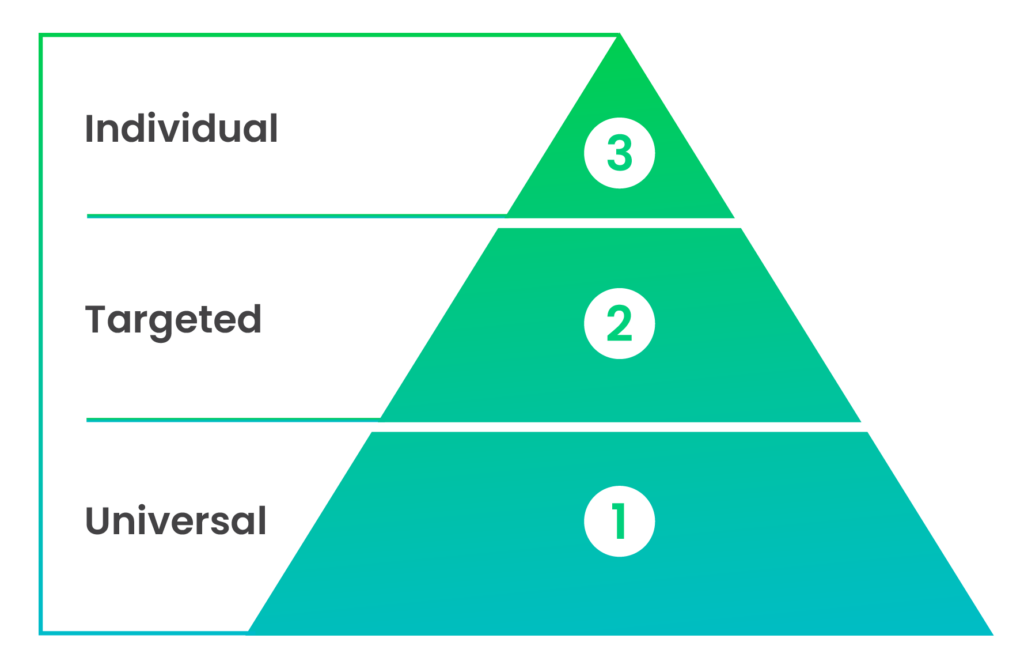Every student deserves the chance to thrive—but ensuring that happens isn’t easy. As an educational leader, you juggle countless challenges to provide equitable support for all students. A Multi-Tiered System of Supports (MTSS), paired with early identification and intervention, can help schools cut through the complexity and give students the academic, social, and behavioral support they need to succeed.
A key component of MTSS is the use of universal screeners, which help pave the way for more effective and equitable support.
The Role of Universal Screeners in MTSS
Universal screeners are systematic assessment tools that provide comprehensive insights into students’ competencies across various domains. These tools are crucial in evaluating the effectiveness of Tier 1 instruction, identifying at-risk students, and shaping targeted intervention strategies. They offer educators a proactive way to address student challenges and allocate resources more effectively, fostering equity and improving outcomes.
“While the concept of universal screening is not new, its importance, particularly in the realm of social behavior and emotional competencies, has gained prominence since the onset of the pandemic, with a significant focus on students in need of social behavior support.” – Brandy Samuell, M.Ed., Director of Mental Health and Related Services for eLuma
Key Functions of Universal Screeners
- Assessing Tier 1 Strength: Screeners offer a broad view of what is working well within the general education environment, helping educators understand the overall effectiveness of instruction and identify areas for growth.
- Identifying At-Risk Students: These tools enable the early identification of students who may need additional support, allowing timely intervention before challenges escalate.
- Data-Driven Decision-Making: Screener results provide actionable insights to guide lesson planning, intervention strategies, and resource allocation, ensuring all students have the opportunity to thrive.
Types of Universal Screeners
- Academic Screeners: Academic screeners assess proficiency in core areas like math, reading, and writing. By highlighting trends in student performance, these tools help identify where Tier 1 instruction needs adjustment and which students may require additional support.
- Social-Emotional Screeners: Social-emotional screeners evaluate competencies such as self-awareness, self-management, and relationship skills. They focus on students’ strengths, offering a holistic perspective that fosters understanding and growth.
- Behavioral Screeners: Behavioral screeners focus on attributes like self-regulation, impulsivity, and attention. Identifying behaviors that externalize and internalize early helps educators provide tailored support to ensure students stay on track academically and socially.

Integrating Universal Screeners into the MTSS Framework
Universal screeners play a pivotal role across all tiers of the MTSS framework:
- Tier 1: They provide baseline data to inform high-quality, universally accessible instruction and evaluate its effectiveness.
- Tier 2: Screeners help identify at-risk students, enabling educators to implement targeted small-group interventions based on specific needs.
- Tier 3: For students requiring the most intensive support, screeners help develop individualized intervention plans tailored to their unique challenges.
By enabling early detection, universal screeners ensure timely intervention and prevent students from falling through the cracks.
Implementing Universal Screening
- Define Goals and Create a Calendar:
- Clearly articulate the purpose of the screening, such as identifying at-risk students or informing instruction.
- Schedule screenings three times yearly to monitor progress and adapt strategies as needed.
- Select the Right Screener:
- Involve key stakeholders in the selection process, including administrators, teachers, and specialists.
- Ensure the screener is valid, reliable, and aligned with your school’s specific focus areas.
- Consider factors like cost, ease of use, and existing norms to make an informed choice.
- Train Staff:
- Provide comprehensive training on how to administer the screener and interpret results.
- Offer ongoing support and professional development to ensure consistent and effective use of the tool.
- Develop an Assessment Schedule:
- Assign responsibilities for administering the screener.
- Plan for accommodations and make-up testing to include all students.
- Establish processes for data review and follow-up to ensure timely action.
- Administer the Screener:
- Communicate the purpose and schedule of the screening to families and staff.
- Ensure adherence to the planned schedule to maintain consistency and reliability.
- Interpret Data:
- Analyze trends and patterns to guide instructional decisions and interventions.
- Share results with the MTSS team to develop targeted support plans for students who need additional assistance.
- Implement and Monitor Interventions:
- Group students for Tier 2 or Tier 3 interventions based on their specific needs.
- Use progress monitoring to refine strategies and ensure the effectiveness of interventions over time.

Addressing Challenges in Universal Screening
- Staff Training:
- Challenge: Training can be time-intensive and costly.
- Solution: Opt for screeners offering online training modules to streamline the process and reduce costs.
- Resource Constraints:
- Challenge: Limited budgets and staffing may hinder effective implementation.
- Solution: Select cost-effective screening tools and consider outsourcing certain aspects, such as data analysis, to maximize resources.
- Time Management:
- Challenge: Coordinating assessments without disrupting instructional time.
- Solution: Assign a dedicated team to oversee scheduling and administration, minimizing classroom interruptions.
- Linking Data to Instruction:
- Challenge: Ensuring screener data translates into actionable strategies.
- Solution: Choose tools that align with instructional goals and provide clear, actionable insights to bridge the gap between assessment and practice.

Maximizing Outcomes with eLuma
At eLuma, we understand the challenges educators face in implementing universal screening and strengthening their MTSS framework.
These challenges can feel overwhelming, but you don’t have to face them alone. With eLuma’s solutions, schools can enhance their MTSS framework and ensure every student receives the support they need to thrive.
We offer:
- Strength-Based Screeners: When administered by licensed providers, screeners capture a well-rounded view of student capabilities.
- Evidence-Based Interventions: Tailored to the specific needs identified through screening.
- Expert Consulting: Providing actionable, data-driven decision support to strengthen your MTSS framework.
- Staff Training and Implementation Support: Ensuring seamless integration and effective use of screening tools.
Universal screening is a foundational element of an equitable and effective MTSS framework. By partnering with eLuma, your school can streamline the screening process, address challenges, and improve student outcomes.
Schedule a free consultation today to learn how eLuma can help your school achieve its goals.


